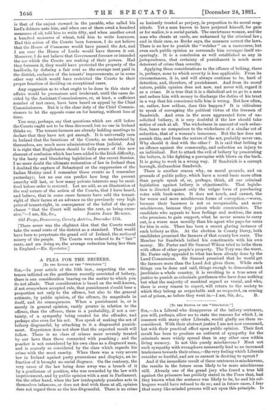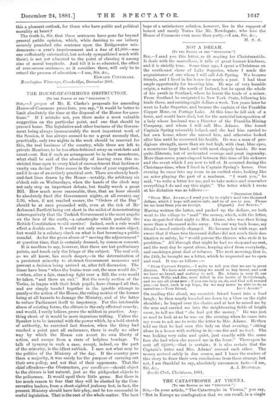[TO THE EDITOR OF THE "SPECTATOR. "] Sia, — As a Liberal who
disapproves of the bribery sentences,. you will, perhaps, allow me to state the reasons for which I, in common with many other Liberals, would gladly see them re- considered. With their abstract justice I am not now concerned,. but with their practical effect upon public opinion. Their first result has been to produce an outburst of sympathy for the criminals more widely spread than in any other case within living memory. Is not this purely mischievous P Must not such sympathy with wrongdoers necessarily lead to an increased. tenderness towards their crime,—the very feeling which Liberal& consider so hurtful, and are so earnest in desiring to uproot ?
And if the immediate result of these sentences is mischievous,. the results in the future seem likely to be more mischievous• still. Already one of the grand jury who found a true bill against the prisoners has publicly stated in the Press that, had they known what the sentence was likely to be, be and his col- leagues would have refused to do so; and in future cases, I fear• that many like-minded persons will act upon this principle. Is this a pleasant outlook, for those who have public and political morality at heart ?
The truth is, Sir, that these sentences have gone far beyond general public opinion, which, while desiring to see bribery severely punished (the sentence upon the Bridgewater mis- demeants—a year's imprisonment and a fine of £1,000—was one sufficiently substantial, but nobody sympathised much with them), is not yet educated to the point of classing it among sins of moral turpitude. And till it is so educated, the effect of over-severe sentences, as it considers these, will only be to retard the process of education.—I am, Sir, &c.,
EDWARD CONYEEARE.
Barrington Vicarage, Cambridge, December 20th.







































 Previous page
Previous page